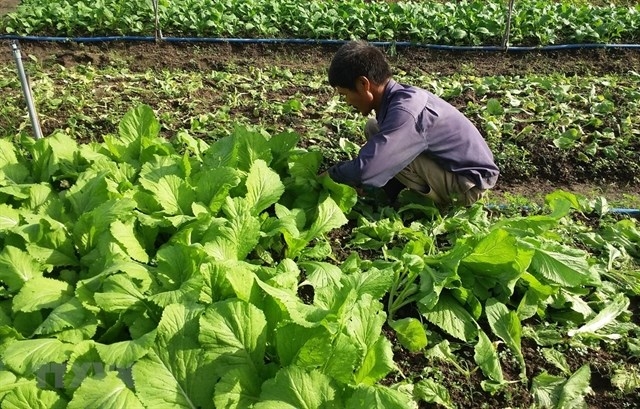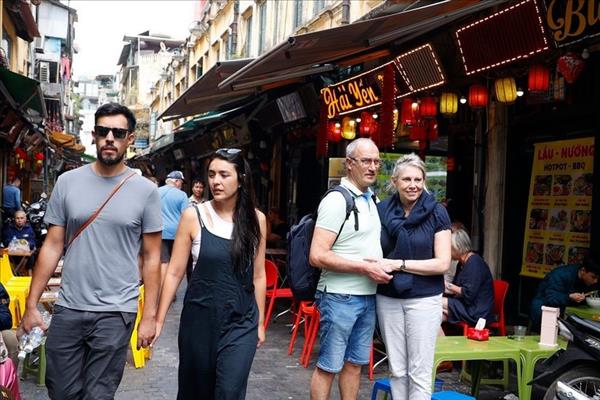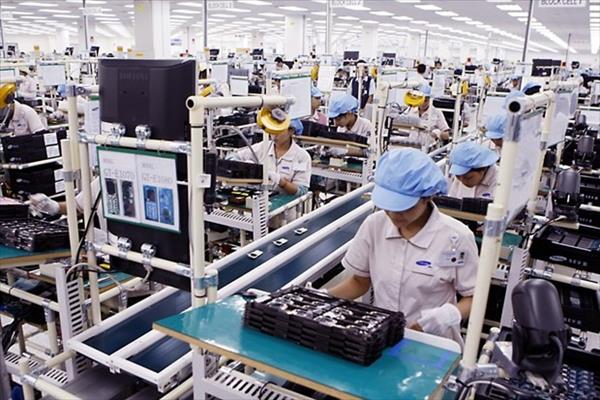Now, on an area of nearly 400sq.m in Long Huong district in the city of Ba Ria, Quang has set up a farm to experiment on different vegetables, from spinach and bok choy to bitter melon.
 Luong Van Quang takes care of his organic garden (Photo: VNA) |
Over time, he has learned soil management is the key factor. The health of the soil must be cultivated and sustained to help the plants thrive and reduce the dependence on fertilisers.
Organic agriculture is labour intensive. Quang uses green manure and compost along with a specialised type of fungus to supply nutrients to the vegetables.
Worms must be picked off the plants by hand or killed using solutions made from natural ingredients – ginger, garlic and chilies marinated in alcohol.
Quang also needs to frequently switch between growing different types of plant to ensure healthy yields and nurture the soil for future crops.
In his first attempts, he struggled. “Productivity dropped, and the products turned out uglier than when using agrochemicals,” he said.
The soil, on the other hand, was gradually growing more fertile, boosting the health of his plants and protecting them against insects and disease, thereby reducing farming costs.
A new market for organic products has sprung up in the province, and 400kg of vegetables now brings Quang’s family a profit of 20 million VND (860 USD) per month.
The provincial department of cultivation and plant protection has chosen Quang’s farm to pilot the organic farming model since May 2017.
Chau Duc Cacao Cooperative in Xa Bang commune, Chau Duc district, is Ba Ria-Vung Tau province’s pioneer in organic farming on a large scale.
According to the co-operative’s director Ho Si Bao, since July 2017, farmers have received training courses on standardised organic cultivation to produce high-quality cacao beans.
An average hectare of cacao trees brings farmers a profit of 100 million VND (4,300 USD). They also signed an offtake agreement with Amazon Food Company, helping to guarantee a market for their crops in the future.
Cacao powder, butter, chocolate and cider made from the co-operative’s organic cacao beans have won the hearts of local people and opened the door to Japan’s market.
The provincial agricultural sector has also decided to make peppercorn a spearhead product to enter competitive markets in Europe and Japan.
A project aiming to develop the cultivation of indigenous peppercorn has been in progress since 2013 by the Ba Ria-Vung Tau province's Association of Pepper in cooperation with private companies on an area of 1,300ha in the districts of Chau Duc and Xuyen Moc.
Farmers that join the product are assisted in obtaining international certificates of sustainable cultivation including Global GAP or Rainforest Alliance certifications.
These efforts, however, are just a drop in the bucket, according to the provincial department of agriculture and rural development.
In the southeastern province, the use of fertilisers and pesticides has long been rooted in the minds of local farmers.
The switch to organic farming, therefore, cannot be completed overnight.
While they have found a place in the market, organic products still struggle to compete against cheaper traditional crops.
“It takes time and money to expand the area of organic farms and instruct farmers on sustainable practices, and to gain a foothold in the markets,” said the department's director Tran Van Cuong.
In April, the People's Committee of Ba Ria-Vung Tau province issued a decision to support organic agricultural production until 2025.
In the first phase from 2020 to 2022, five pilot projects on a total area of 1.9ha will be built to develop technical procedures to cultivate vegetables, peppercorns and cacao.
The area will be further expanded to 52.2ha from 2023 to 2025, on which seven other types of plants and fish will be tested.
The province will also develop and replicate models of certified organic agricultural production in its subsidiaries.
About 18.9 billion VND (812,700 USD) will be poured into this ambitious plan, of which 9.4 billion VND (404,200 USD) has been allocated from the local budget and the rest will be funded by private firms.
VNS/VNP

















